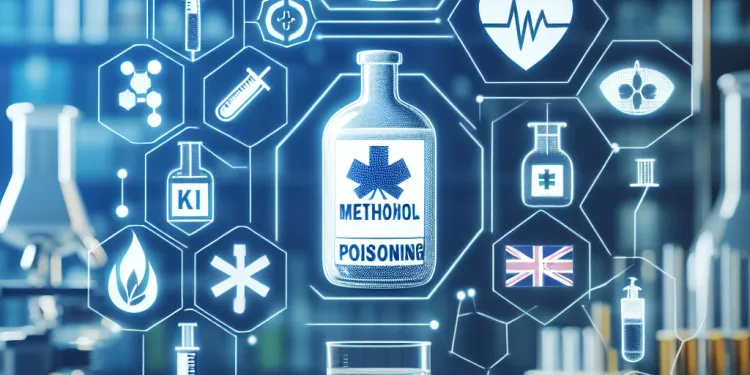
Find Help
More Items From Ergsy search
-

Can methanol poisoning cause permanent damage?
Relevance: 100%
-

What is methanol poisoning?
Relevance: 68%
-

What are the symptoms of methanol poisoning?
Relevance: 65%
-

Can methanol poisoning be treated?
Relevance: 62%
-

How does methanol poisoning differ from ethanol poisoning?
Relevance: 60%
-

Is dialysis used in methanol poisoning cases?
Relevance: 60%
-

What should you do if you suspect methanol poisoning?
Relevance: 58%
-

How can methanol poisoning be prevented?
Relevance: 56%
-

How quickly do symptoms of methanol poisoning appear?
Relevance: 54%
-

Why is methanol dangerous to humans?
Relevance: 52%
-

Is there a risk of permanent nerve damage?
Relevance: 51%
-

Can sunburns cause permanent damage?
Relevance: 49%
-

What types of visual disturbances are associated with methanol poisoning?
Relevance: 45%
-

Is there a specific test to diagnose methanol poisoning?
Relevance: 41%
-

Why is methanol sometimes found in illegally produced alcohol?
Relevance: 41%
-

What is the role of ethanol in the treatment of methanol poisoning?
Relevance: 40%
-

What are the differences between methanol and ethanol?
Relevance: 34%
-

What is alcohol poisoning?
Relevance: 31%
-

What is fomepizole and how does it work?
Relevance: 30%
-

Are there any long-term effects of rice food poisoning?
Relevance: 30%
-

What first aid measures can be taken in case of methanol exposure?
Relevance: 26%
-

Can tinnitus be a sign of hearing damage?
Relevance: 25%
-

What are the symptoms of Bacillus cereus food poisoning?
Relevance: 25%
-

Why is rice particularly risky for food poisoning?
Relevance: 24%
-

How to tell if you have food poisoning (symptoms) | NHS
Relevance: 23%
-

What should I do if I suspect food poisoning from rice?
Relevance: 23%
-

Can pets damage mosquito screens?
Relevance: 23%
-

Blood Poisoning - Sepsis
Relevance: 21%
-

Are there any poisonous spiders in the UK?
Relevance: 21%
-

What professions are at higher risk of methanol exposure?
Relevance: 20%
-

Can methanol be absorbed through the skin?
Relevance: 12%
-

Should I throw away rice that's been left out overnight?
Relevance: 11%
-

Can old rice kill me?
Relevance: 11%
-

Is uncooked rice dangerous?
Relevance: 11%
-

What is binge drinking?
Relevance: 11%
-

Can binge drinking affect physical health?
Relevance: 10%
-

What makes old rice dangerous?
Relevance: 10%
-

How is binge drinking typically defined?
Relevance: 10%
-

Is it safe to eat reheated rice?
Relevance: 10%
-

Is hypotony a medical emergency?
Relevance: 10%
Introduction
Methanol poisoning can have serious and potentially life-threatening effects. Methanol, also known as wood alcohol, is a toxic substance that can cause various health issues if ingested, inhaled, or absorbed through the skin. Given its potential harmful effects, it's crucial to understand the risks associated with methanol exposure, particularly regarding permanent damage.
What is Methanol?
Methanol is a type of alcohol commonly used as an industrial solvent, antifreeze, fuel, and denaturant for ethanol. It is a colorless liquid that is volatile and flammable. Unlike ethanol, which is found in alcoholic beverages and is safe in moderate amounts, methanol is highly toxic to humans and should not be consumed.
Causes of Methanol Poisoning
Methanol poisoning usually occurs when methanol is accidentally ingested or intentionally consumed as a surrogate for ethanol. This can happen with homemade or improperly prepared alcoholic beverages. Inhalation of methanol vapors or absorption through the skin can also lead to poisoning, although ingestion is the most common route of toxicity.
Symptoms of Methanol Poisoning
Initial symptoms of methanol poisoning can be similar to those of ethanol intoxication, including dizziness, headache, and nausea. As the body begins to metabolize methanol, more serious symptoms can develop, such as visual disturbances, abdominal pain, and changes in consciousness. These symptoms are primarily caused by the accumulation of toxic metabolites, such as formic acid, which can lead to metabolic acidosis.
Risk of Permanent Damage
Methanol poisoning poses a significant risk of permanent damage, particularly to the optic nerve and central nervous system. Optic nerve damage can lead to irreversible vision loss or blindness, which is a well-documented complication of methanol toxicity. The nervous system may also suffer irreversible damage, potentially leading to motor dysfunction and cognitive impairments.
Treatment and Prognosis
Treatment of methanol poisoning involves the administration of antidotes such as fomepizole or ethanol, which inhibit the metabolism of methanol into its toxic metabolites. Hemodialysis may be employed to accelerate the removal of methanol and its metabolites from the body. Prompt medical intervention is crucial to prevent irreversible damage. The prognosis depends on the severity of the poisoning and the timeliness of treatment. Even with prompt treatment, some individuals may still experience permanent effects, particularly if treatment is delayed.
Conclusion
Methanol poisoning is a medical emergency that can lead to permanent damage if not treated promptly. It is important to avoid exposure and seek immediate medical attention if poisoning is suspected. Public awareness and education are key components in preventing methanol poisoning incidents, ensuring the safety and well-being of individuals.
Frequently Asked Questions
What is methanol poisoning?
Methanol poisoning occurs when methanol, a toxic alcohol, is ingested and metabolized in the body, causing harmful effects.
What are the symptoms of methanol poisoning?
Symptoms include headache, dizziness, nausea, vomiting, abdominal pain, blurred vision, and in severe cases, respiratory failure, seizures, and coma.
How does methanol cause damage to the body?
Methanol is metabolized in the liver to formaldehyde and formic acid, which are toxic and can cause metabolic acidosis and damage various organs.
Can methanol poisoning cause permanent damage?
Yes, methanol poisoning can cause permanent damage, particularly to the eyes and nervous system, leading to blindness and neurological deficits.
What organs are most affected by methanol poisoning?
The central nervous system and the eyes are most affected, but severe poisoning can impact multiple organ systems.
Is blindness from methanol poisoning permanent?
Yes, methanol can cause permanent damage to the optic nerve, leading to irreversible blindness.
How is methanol poisoning treated?
Treatment involves administering antidotes like fomepizole or ethanol, correcting metabolic acidosis, and sometimes hemodialysis to remove methanol.
What is the prognosis for methanol poisoning?
The prognosis varies; early treatment improves outcomes, but delays can lead to permanent damage or death.
How quickly can methanol poisoning lead to permanent damage?
Permanent damage can occur within hours to days without treatment, depending on the severity of exposure.
Can methanol poisoning be detected by blood tests?
Yes, blood tests can measure methanol levels and assess metabolic acidosis, which aids in diagnosis.
Can methanol poisoning cause neurological issues?
Yes, it can cause neurological issues such as seizures, motor impairment, and cognitive deficits.
What preventive measures can be taken against methanol poisoning?
Preventive measures include proper labeling and storage of methanol-containing products and education on their risks.
Are some people more susceptible to methanol poisoning than others?
Children and individuals with underlying health conditions may be more susceptible to its toxic effects.
Can methanol poisoning occur through skin contact or inhalation?
Yes, though less common than ingestion, significant exposure through skin contact or inhalation can cause toxicity.
What role does formaldehyde play in methanol poisoning?
Formaldehyde, a methanol metabolite, is toxic and contributes to tissue damage and toxic effects in the body.
Can methanol poisoning affect cognitive functions?
Yes, methanol poisoning can lead to cognitive impairments and affect memory, attention, and executive functions.
Can dietary habits influence methanol poisoning severity?
Certain factors like fasting can increase susceptibility to methanol’s toxic effects due to enhanced conversion to harmful metabolites.
Is there a safe level of methanol exposure?
Small amounts occur naturally in some foods, but ingestion of high concentrations, particularly in poorly regulated alcoholic beverages, poses significant risk.
Can supportive care improve outcomes in methanol poisoning cases?
Yes, supportive care, including ventilation and electrolyte management, is crucial alongside antidotal therapy to improve outcomes.
How does alcohol intake influence methanol metabolism?
Ethanol competes with methanol for alcohol dehydrogenase, slowing methanol metabolism and its conversion to toxic metabolites.
Useful Links
This website offers general information and is not a substitute for professional advice.
Always seek guidance from qualified professionals.
If you have any medical concerns or need urgent help, contact a healthcare professional or emergency services immediately.
Some of this content was generated with AI assistance. We’ve done our best to keep it accurate, helpful, and human-friendly.
- Ergsy carfully checks the information in the videos we provide here.
- Videos shown by Youtube after a video has completed, have NOT been reviewed by ERGSY.
- To view, click the arrow in centre of video.
- Most of the videos you find here will have subtitles and/or closed captions available.
- You may need to turn these on, and choose your preferred language.
- Go to the video you'd like to watch.
- If closed captions (CC) are available, settings will be visible on the bottom right of the video player.
- To turn on Captions, click settings .
- To turn off Captions, click settings again.
More Items From Ergsy search
-

Can methanol poisoning cause permanent damage?
Relevance: 100%
-

What is methanol poisoning?
Relevance: 68%
-

What are the symptoms of methanol poisoning?
Relevance: 65%
-

Can methanol poisoning be treated?
Relevance: 62%
-

How does methanol poisoning differ from ethanol poisoning?
Relevance: 60%
-

Is dialysis used in methanol poisoning cases?
Relevance: 60%
-

What should you do if you suspect methanol poisoning?
Relevance: 58%
-

How can methanol poisoning be prevented?
Relevance: 56%
-

How quickly do symptoms of methanol poisoning appear?
Relevance: 54%
-

Why is methanol dangerous to humans?
Relevance: 52%
-

Is there a risk of permanent nerve damage?
Relevance: 51%
-

Can sunburns cause permanent damage?
Relevance: 49%
-

What types of visual disturbances are associated with methanol poisoning?
Relevance: 45%
-

Is there a specific test to diagnose methanol poisoning?
Relevance: 41%
-

Why is methanol sometimes found in illegally produced alcohol?
Relevance: 41%
-

What is the role of ethanol in the treatment of methanol poisoning?
Relevance: 40%
-

What are the differences between methanol and ethanol?
Relevance: 34%
-

What is alcohol poisoning?
Relevance: 31%
-

What is fomepizole and how does it work?
Relevance: 30%
-

Are there any long-term effects of rice food poisoning?
Relevance: 30%
-

What first aid measures can be taken in case of methanol exposure?
Relevance: 26%
-

Can tinnitus be a sign of hearing damage?
Relevance: 25%
-

What are the symptoms of Bacillus cereus food poisoning?
Relevance: 25%
-

Why is rice particularly risky for food poisoning?
Relevance: 24%
-

How to tell if you have food poisoning (symptoms) | NHS
Relevance: 23%
-

What should I do if I suspect food poisoning from rice?
Relevance: 23%
-

Can pets damage mosquito screens?
Relevance: 23%
-

Blood Poisoning - Sepsis
Relevance: 21%
-

Are there any poisonous spiders in the UK?
Relevance: 21%
-

What professions are at higher risk of methanol exposure?
Relevance: 20%
-

Can methanol be absorbed through the skin?
Relevance: 12%
-

Should I throw away rice that's been left out overnight?
Relevance: 11%
-

Can old rice kill me?
Relevance: 11%
-

Is uncooked rice dangerous?
Relevance: 11%
-

What is binge drinking?
Relevance: 11%
-

Can binge drinking affect physical health?
Relevance: 10%
-

What makes old rice dangerous?
Relevance: 10%
-

How is binge drinking typically defined?
Relevance: 10%
-

Is it safe to eat reheated rice?
Relevance: 10%
-

Is hypotony a medical emergency?
Relevance: 10%


